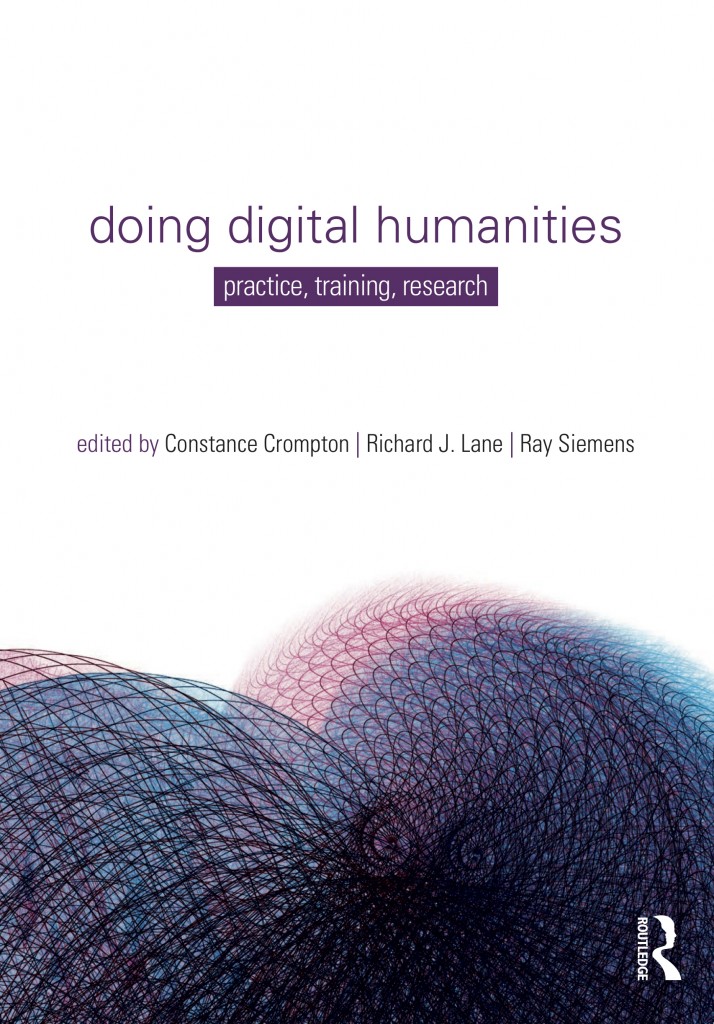 This collection is intended for scholars, students, practitioners, developers, administrators, and members of the public who are creating, supporting, or evaluating digital humanities scholarship. Doing Digital Humanities provides accessible introductions to the theoretical, technical, and social underpinnings of the field, alongside resources for starting digital humanities projects, including training materials and exercises, further readings, and case studies. For more information or to order a copy, please visit the book’s Routledge site or Amazon.
This collection is intended for scholars, students, practitioners, developers, administrators, and members of the public who are creating, supporting, or evaluating digital humanities scholarship. Doing Digital Humanities provides accessible introductions to the theoretical, technical, and social underpinnings of the field, alongside resources for starting digital humanities projects, including training materials and exercises, further readings, and case studies. For more information or to order a copy, please visit the book’s Routledge site or Amazon.
Contents
Preface, Raymond Siemens
Introduction, Constance Crompton, Richard J. Lane and Raymond Siemens
Foundations
1. Thinking-Through the History of Computer-Assisted Text Analysis, Geoffrey Rockwell and Stéfan Sinclair
2. Global Outlooks in Digital Humanities: Multilingual Practices and Minimal Computing, Alex Gil and Élika Ortega
3. Problems with White Feminism: Intersectionality and Digital Humanities, Jacqueline Wernimont and Elizabeth Losh
4. Towards Best Practices in Collaborative Online Knowledge Production, Susan Brown
5. Understanding the Pre-Digital Book, Hélène Cazes and J. Matthew Huculak
Core Concepts and Skills
6. Critical Computing in the Humanities, Phillip R. Polefrone, John Simpson, and Dennis Yi Tenen
7. Text Encoding, Julia Flanders, Syd Bauman, and Sarah Connell
8. Computational Stylistics and Text Analysis, Jan Rybicki, Maciej Eder, and David Hoover
9. Databases, Harvey Quamen and Jon Bath
10. Digitalization Fundamentals, Robin Davies and Michael Nixon
11. Geographical Information Systems as a Tool for Exploring the Spatial Humanities, Ian Gregory and Patricia Murrieta-Flores
12. Electronic Literature and Digital Humanities: Opportunities for Practice, Scholarship, and Teaching, Dene Grigar
12a. Electronic Literature: What Is It?, N. Katherine Hayles
12.b Electronic Literature: Where Is It?, Dene Grigar
Creation, Remediation, and Curation
13. Foundations for Digital Editing, with Focus on the Documentary Tradition, Jennifer Stertzer
14. XSLT: Transforming our XML Data, Julia Flanders, Syd Bauman, and Sarah Connell
15. Working with the Semantic Web, James Smith
16. Drupal and Other Content Management Systems, Quinn Dombrowski
17. Augmented Reality, Markus Wust
18. Fabrication and Research-Creation in the Arts and Humanities, Nicole Clouston and Jentery Sayers
19. From Theory to Experience to Making to Breaking: Iterative Game Design for Digital Humanists, Matt Bouchard and Andy Keenan
Administration, Dissemination, and Teaching
20. Project Management and the Digital Humanist, Lynne Siemens
21. Doing DH in the Classroom: Transforming the Humanities Curriculum through Digital Engagement, Diane Jakacki and Katherine Faull
22. Digital Liberal Arts and Project-Based Pedagogies, Aaron Mauro
23. Dissemination as Cultivation: Scholarly Communications in a Digital Age, James O’Sullivan, Christopher P. Long, and Mark Mattson
